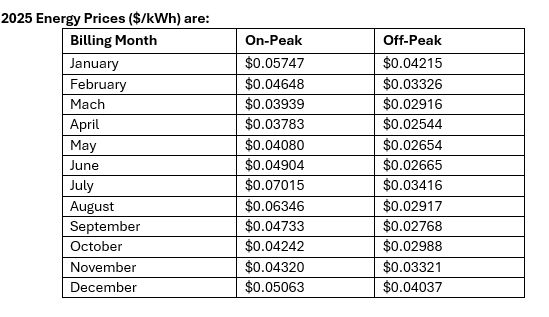These provisions implement the Minnesota Public Utilities Commission’s (PUC) order of September 28, 2004 in Docket E999/CI-01-1023 pursuant to Minnesota Statute 216B.1611 subdivision 3 and are subject to annual review, modification and approval by GRE’s Board of Directors.
These rates are available to any GRE All-Requirements Distribution Member’s (AR Member) retail member-consumer with an eligible on-site distributed generation resource (DG Resource) that has entered into an Electric Service Agreement (ESA) with the AR Member for the interconnection and operation of the DG Resource.
DG Resource eligibility
A DG Resource is eligible if it meets all of the following criteria:
- It is an operable, permanently installed or mobile generation system serving the member-consumer at the same site that the member-consumer receives retail electric service from the AR Member;
- It is connected in parallel to the AR Member’s distribution system and normally operates in an extended parallel configuration;
- It is fueled by:
- Natural gas,
- Renewable fuel,
- Another similarly clean fuel, or
- Any combination of such fuels listed above;
- It does not exceed 10,000 kilowatts (kW) of nameplate capacity interconnected at a point of common coupling to the AR Member’s distribution system; and
- It is not used to participate in GRE’s Interruptible Commercial & Industrial program or any other demand-side management program.
Energy sales to Great River Energy
A member-consumer with an eligible DG Resource may:
- Sell all of the DG Resource energy to GRE,
- Use a portion of the DG Resource energy to meet all or a portion of their electrical requirements and sell the remaining energy to GRE, or
- Use all of the DG Resource energy to meet all or portion of their electrical requirements and sell no energy to GRE.
Options 2 and 3 above are subject to GRE’s standby service requirements.
Capacity sales to Great River Energy
A member-consumer with an eligible DG Resource may also sell capacity to GRE. The capacity of a DG Resource is eligible for purchase by GRE if GRE’s most recent Integrated Resource Plan filed with the PUC identifies a capacity deficit within the 5-year planning period, and either:
- The DG Resource obtains and maintains accreditation as a capacity resource under the Midcontinent Independent System Operator’s (MISO) Module E, or
- If the GRE MISO accreditation requirement is waived, the DG Resource provides Firm Power as defined in Minnesota Rules 7835.
The GRE MISO accreditation requirement will be waived if:
- The DG Resource has a nameplate less than 1,000 kW, and
- The DG Resource nameplate capacity, together with previously connected DG Resources’ nameplate capacity, does not exceed the minimum expected load on the AR Member’s distribution substation connected to these resources.
Power purchase agreement
GRE and the member-consumer will enter into a Power Purchase Agreement (PPA) for the energy and any other products sold to GRE under the terms of the PPA. The energy and other product prices will be established on a calendar year basis. Payments for energy and any other products will be made by GRE directly to the member-consumer.
Interconnection and operation requirements
The interconnection and operation of a member-consumer’s eligible DG Resource will be subject to any applicable requirements of the Midcontinent Independent System Operator, Inc (MISO).
- The member-consumer will be responsible for making all required arrangements with MISO for the interconnection of the DG Resource to the AR Member’s distribution system and for the delivery of the DG Resource products to GRE. This obligation includes, but is not limited to:
a) Completion of all required interconnection applications, and
b) Arranging for and completing all technical studies required by MISO, and
c) Compliance with any required interconnection agreement. - If a member-consumer’s DG Resource is exempt from the MISO interconnection requirements, then the interconnection process will be governed by the AR Member’s Interconnection Process for Distributed Generation Systems and Distributed Generation Interconnection Requirements.
GRE will not be responsible for the costs of any upgrades or investment in the transmission or distribution system required for interconnection or delivery of energy or other products from the member-consumer’s DG Resource to GRE.
AR member services from GRE
GRE will provide the AR Member with firm standby service and non-firm standby service for eligible DG Resources under the terms and conditions described on our standby service page.
2025 prices
Energy
The energy billing units will be based upon the total metered output recorded at the DG Resource and delivered to the AR Member’s distribution system less any amount used by the member-consumer to meet their energy requirements.
- If the peak hourly amount of energy sold to GRE during the billing month is less than 1,000 kWh, then GRE shall pay the member-consumer for 100% of the energy delivered to GRE during that month.
- If the peak hourly amount of energy sold to GRE during the billing month is greater than 1,000 kWh, then GRE shall only pay the member-consumer for 95% of the energy sold to GRE during the month. This 5% reduction in the billing energy units will be a proxy for line losses experienced on the AR Member’s distribution system.
Energy payments will be net of any distribution system wheeling costs charged to GRE by the AR Member.

Capacity
2025 Capacity Price: $5.08 ($/kW-month)
Renewable Energy Certificates
2025 Renewable Energy Certificate price: $0.0045 ($/kWh)
For more information, please contact your distribution cooperative.